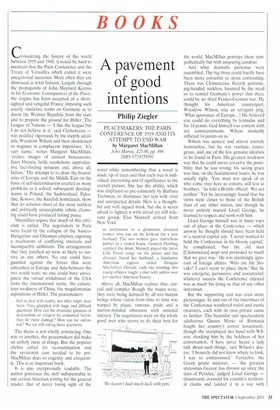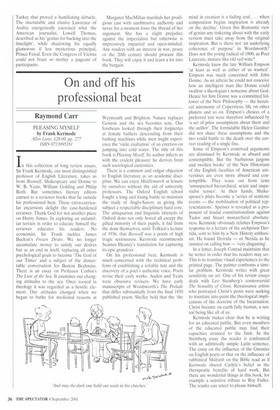A pavement of good intentions
Philip Ziegler
PEACEMAKERS: THE PARIS CONFERENCE OF 1919 AND ITS ATTEMPT TO END WAR by Margaret MacMillan John Murray, £25.00, pp. 496 ISBN 0719559391 Considering the history of the world between 1919 and 1945, it would be hard to maintain that the Paris Conference and the Treaty of Versailles which ended it were unequivocal successes. More often they are dismissed as total failures. Largely through the propaganda of John Maynard Keynes in his Economic Consequences of the Peace, the dogma has been accepted of a shortsighted and vengeful France imposing such cruelly vindictive terms on Germany as to doom the Weimar Republic from the start and to prepare the ground for Hitler. The League of Nations — 'I like the league but I do not believe in it,' said Clemenceau — was peddled vigorously by the ineptly idealistic Woodrow Wilson and then abandoned to stagnate in complacent impotence. 'It's very name,' writes Margaret MacMillan, 'evokes images of earnest bureaucrats, fuzzy liberals, futile resolutions, unproductive fact-finding missions and, above all, failure.' The attempt to re-draw the boundaries of Europe and the Middle East on the basis of self-determination created as many problems as it solved: subsequent developments in Poland, the Sudetenland, Palestine, Kosovo, the Kurdish homelands, show that no solution short of the most ruthless and politically unacceptable ethnic cleansing could have produced lasting peace.
Macmillan argues that much of this criticism is unfair. The negotiators in Paris were faced by the collapse of the AustroHungarian and Ottoman empires, exposing a maelstrom of conflicting interests and incompatible ambitions. The arrangements that they patched up were as likely to survive as any others. No one could have guarded against the forces that were unleashed in Europe and Asia between the two world wars; no one could have anticipated the virtual withdrawal of the USA from the international scene, the calamitous weakness of China, the megalomaniac aspirations of Hitler. The peacemakers
had to deal with reality, not what might have been. They grappled with huge and difficult questions. How can the irrational passions of nationalism or religion be contained before they do more damage? How can we outlaw war? We are still asking those questions.
The thesis is not wholly convincing. One way or another, the peacemakers did make an unholy mess of things. But the popular cliches called for re-examination and the revisionist case needed to be put. MacMillan does so cogently and eloquently. This is an important book.
It is also exceptionally readable. The author possesses the skill indispensable to any serious historian writing for the general reader: that of never losing sight of the wood while remembering that a wood is made up of trees and that each tree is individual, interesting and of significance in the overall picture. She has the ability, which was displayed so pre-eminently by Barbara Tuch man, to illuminate her text with vivid and unexpected details. Hers is a thoughtful and well argued book, but she is never afraid to lighten it with trivial yet still relevant gossip. Elsa Maxwell arrived from New York
as companion to a glamorous divorced woman who was on the lookout for a new husband. The two women gave marvellous parties in a rented house. General Pershing supplied the drink; Maxwell played the latest Cole Porter songs on the piano; and the divorcee found her husband, a handsome American captain called Douglas MacArthur. Outside, early one morning, two young officers fought a duel with sabres over yet another American beauty.
Above all, MacMillan realises that, crucial and complex though the issues were, they were being debated by all too human beings whose vision from time to time was warped by pique, rancour, pride and a narrow-minded obsession with national interest. The negotiators were on the whole good men who strove to do their best for the world; MacMillan portrays them sympathetically but with unsparing candour.
And what dramatis personae were assembled, The big three could hardly have been more colourful or more contrasting. There was Clemenceau. fiercely patriotic, pig-headed, reckless, haunted by the need so to restrict Germany's power that there could be no third Franco-German war. He thought his American counterpart, Woodrow Wilson, was an arrogant prig: 'What ignorance of Europe...! He believed you could do everything by formulas and his 14 points. God himself was content with ten commandments. Wilson modestly inflicted 14 points on us.'
Wilson was austere and almost entirely humourless. but he was resolute, courageous, and one of the few genuine idealists to be found in Paris. His greatest weakness was that he could never conceive the possibility that he was wrong; his saving grace was that, on the fundamental issues. he was usually right. 'You must not speak of us who come over here as cousins, still less as brothers, he told a British official. 'We are neither.' Yet he increasingly found that his views were closer to those of the British than of any other nation, and though he never entirely trusted Lloyd George, he learned to respect and work with him.
Lloyd George himself was in many ways out of place at the Conference — which anyway he thought should have been held in a neutral capital city. never wanted to hold the Conference in his bloody capital,' he complained, 'but the old man [Clemenceau} wept and protested so much that we gave way.' He was alarmingly ignorant of foreign affairs: 'Who are the Slovaks? I can't seem to place them.' But he was energetic, persuasive and resourceful; whatever success the Conference enjoyed was as much his doing as that of any other statesman.
But the supporting cast was even more picturesque. In and out of the interstices of the Conference wandered weird and exotic creatures, each with its own private cause to further. The beautiful and spectacularly adulterous Queen Marie of Romania fought her country's corner tenaciously, though she overplayed her hand with Wilson, shocking him by the boldness of her conversation. 'I have never heard a lady talk about such things,' said Wilson's doctor. 'I honestly did not know where to look, I was so embarrassed.' Venizelos, the Greek prime minister, -'the greatest statesman Greece has thrown up since the days of Pericles,' judged Lloyd George — disastrously oversold his country's territorial claims and landed it in a war with Turkey that proved a humiliating debacle. The inscrutable and elusive Lawrence of Arabia energetically exercised what the American journalist, Lowell Thomas, described as his 'genius for backing into the limelight', while shadowing his equally glamorous if less mysterious principal, Prince Feisal. Even the Congress of Vienna could not boast so motley a pageant of participants. Margaret MacMillan marshals her prodigious cast with unobtrusive authority and never for a moment loses the thread of her argument. She has a slight prejudice against the imperialists but otherwise is impressively impartial and open-minded. Any readers with an interest in war, peace or the 20th century should procure this book. They will enjoy it and learn a lot into the bargain.



































































 Previous page
Previous page